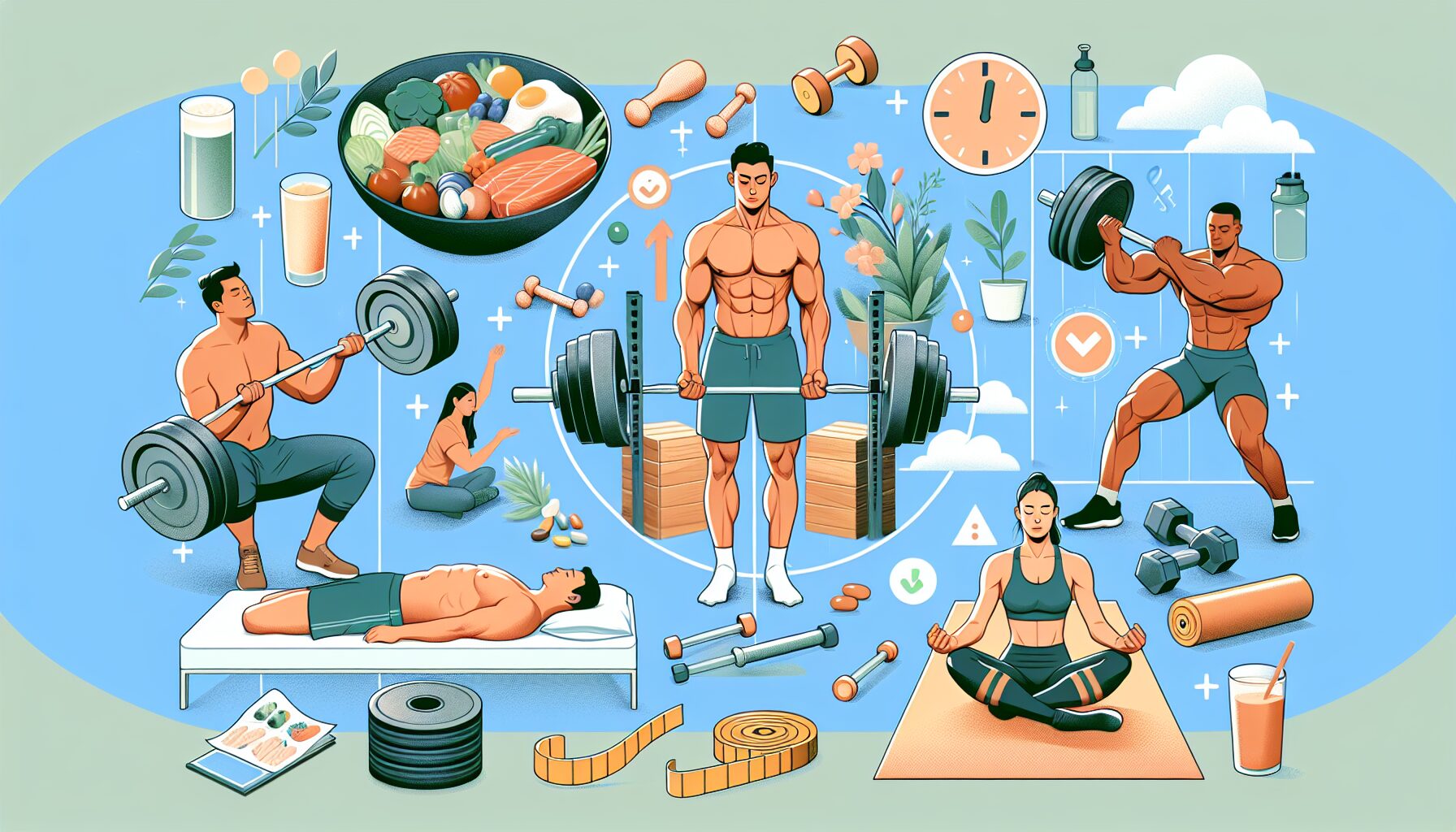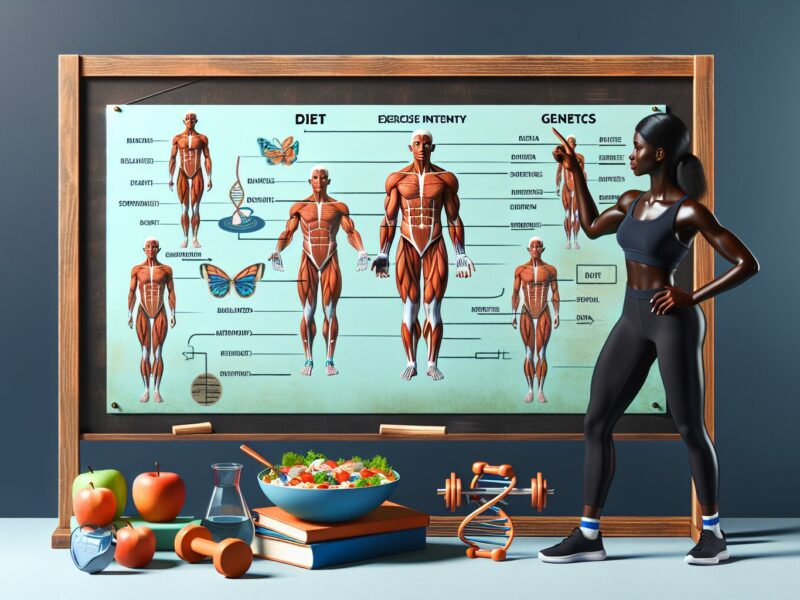If you’re looking to boost your muscle growth and achieve your fitness goals in record time, you’re in the right place. In this article, we’ll explore the secrets behind accelerating muscle growth and uncover the key factors that contribute to a faster and more efficient muscle-building process. From nutrition and exercise to recovery techniques and the power of consistency, we’ll reveal the tried and tested methods that will propel you on your journey to a stronger, more muscular physique. Get ready to unlock the secrets of muscle growth and discover the tools you need to maximize your gains.

Benefits of Muscle Growth
Increased Strength
One of the key benefits of muscle growth is increased strength. As you build and develop your muscles, you will notice a significant improvement in your overall strength. This not only enhances your performance in the gym but also in your day-to-day activities. You will find it easier to lift heavy objects, perform physical tasks, and engage in activities that require strength and power. Whether you are carrying groceries, moving furniture, or participating in sports, having increased strength can greatly improve your ability to excel in various activities.
Improved Athletic Performance
Muscle growth plays a vital role in improving athletic performance. Athletes who focus on building their muscles not only enhance their strength but also their speed, power, and agility. Strong muscles allow athletes to move efficiently, generate more force, and perform explosive movements with ease. Whether you are a sprinter, a basketball player, or a soccer player, having well-developed muscles can help you excel in your chosen sport. So, if you want to take your athletic performance to the next level, muscle growth is key.
Enhanced Metabolism
Another fantastic benefit of muscle growth is an enhanced metabolism. Your metabolism refers to the rate at which your body burns calories. The more muscle mass you have, the higher your metabolic rate will be. This means that even at rest, your body will burn more calories, helping you maintain a healthy weight or even lose weight more easily. Building muscles through regular resistance training can be a great way to boost your metabolism and support your weight management goals.
Reduced Risk of Injury
Having strong and well-developed muscles can significantly reduce the risk of injury. Muscles act as a protective cushion for your joints, tendons, and ligaments. When you engage in physical activities, strong muscles help absorb the impact and reduce the stress on your joints and connective tissues. Additionally, building muscles helps improve your posture and alignment, reducing the risk of musculoskeletal imbalances and related injuries. So, if you want to stay active and injury-free, focusing on muscle growth is essential.
Improved Overall Physique
Last but not least, muscle growth can greatly enhance your overall physique. As your muscles develop and become more defined, you will notice improvements in your body shape and composition. Building muscles can help you achieve a toned and sculpted look, highlighting your natural physique and boosting your confidence. In addition to the aesthetic benefits, having a well-defined and muscular physique is often associated with good health and vitality. So, if you want to improve your physical appearance and feel more confident in your own skin, muscle growth is a fantastic way to achieve that.
Importance of Proper Nutrition
Caloric Surplus
To support muscle growth, it is crucial to consume an adequate amount of calories. This means consuming more calories than you burn in a day, known as being in a caloric surplus. This surplus provides the necessary energy to fuel your workouts, repair muscle tissue, and promote muscle growth. However, it is important to strike a balance and avoid excessive calorie intake, as it can lead to unwanted fat gain.
Macronutrient Distribution
The distribution of macronutrients, including carbohydrates, proteins, and fats, plays a crucial role in muscle growth. Carbohydrates provide the main source of energy for your body, especially during intense training sessions. Proteins are the building blocks of muscle and are essential for muscle repair and growth. Fats, although often misunderstood, are essential for hormone production and overall health. Balancing these macronutrients in your diet is essential to optimize muscle growth and support your fitness goals.
Adequate Protein Intake
As mentioned earlier, protein is essential for muscle growth. Ensuring an adequate protein intake is crucial to promote muscle repair and development. Aim to consume high-quality proteins from sources such as lean meats, fish, poultry, eggs, dairy products, and plant-based protein sources like legumes, tofu, and tempeh. Shoot for a protein intake of around 0.8 to 1 gram per pound of body weight to effectively support muscle growth.
Importance of Carbohydrates
Carbohydrates play a vital role in supporting muscle growth. They provide the energy needed to fuel your workouts and assist in the recovery process. Complex carbohydrates, such as whole grains, fruits, and vegetables, are excellent sources of sustained energy that can support your muscle-building endeavors. Aim to consume carbohydrates before and after your workouts to optimize performance and recovery.
Smart Fat Choices
Contrary to popular belief, dietary fat is an essential component of a well-rounded diet, especially for muscle growth. Healthy fats, such as avocados, nuts, seeds, olive oil, and fatty fish, provide important nutrients and support hormone production. Including these smart fat choices in your diet can promote muscle growth and overall health. However, it is important to consume fats in moderation, as they are calorie-dense.
Micronutrient Consideration
While macronutrients are vital for muscle growth, it is equally important to ensure an adequate intake of essential micronutrients. Vitamins, minerals, and antioxidants play crucial roles in various bodily functions, including muscle repair and recovery. Including a wide variety of colorful fruits and vegetables, whole grains, and other nutrient-dense foods in your diet can help ensure you meet your micronutrient needs and support optimal muscle growth.
Effective Resistance Training
Progressive Overload
Progressive overload refers to gradually increasing the demands placed on your muscles over time. This can be achieved by increasing the weight you lift, the number of repetitions you perform, or the intensity of your workouts. By consistently challenging your muscles with progressive overload, you create a stimulus for growth and adaptation, leading to muscle hypertrophy.
Compound Exercises
Compound exercises involve multiple muscle groups and joints, allowing you to target multiple muscles simultaneously. They are highly effective for muscle growth as they engage a large amount of muscle mass and promote the release of growth-promoting hormones. Examples of compound exercises include squats, deadlifts, bench presses, and pull-ups. Incorporating compound exercises into your resistance training routine can maximize muscle growth and overall strength.
Isolation Exercises
While compound exercises are essential, isolation exercises can also play a valuable role in muscle growth. Isolation exercises target specific muscles or muscle groups, allowing you to focus on developing and strengthening specific areas of your physique. Examples include bicep curls, tricep extensions, and calf raises. By incorporating a combination of compound and isolation exercises, you can ensure balanced muscle development and target specific areas that you want to improve.
Understanding Sets and Reps
Sets and reps are the building blocks of resistance training. A set refers to a specific number of repetitions performed consecutively, while reps refer to the number of times you perform a specific exercise. The ideal number of sets and reps varies depending on your goals and fitness level. Generally, aiming for 3-4 sets of 8-12 reps per exercise is a good starting point for muscle growth. However, it is important to progressively increase the weight and intensity as you become stronger and more experienced.
Optimal Training Frequency
Finding the optimal training frequency is key to promoting muscle growth. While it is important to allow adequate time for recovery, consistent training is crucial for muscle development. Aim to train each muscle group 2-3 times per week, allowing for 48 to 72 hours of rest between sessions targeting the same muscle group. This frequency provides enough stimulus for muscle growth while allowing adequate time for recovery and adaptation.
Incorporating Rest Periods
Rest periods are essential for muscle recovery and growth. During resistance training, your muscles undergo micro-tears, and rest allows them to repair and rebuild stronger. Be sure to include rest days in your training schedule, allowing your muscles and central nervous system to recover. Additionally, incorporating active recovery techniques such as gentle stretching, yoga, or low-intensity cardio can promote blood flow and aid in muscle repair.
Role of Protein in Muscle Growth
Building Blocks of Muscle
Protein serves as the building block for muscle tissue. When you engage in resistance training, microscopic damage occurs to your muscle fibers. Protein is necessary for repairing and rebuilding these fibers, leading to muscle growth and strength gains. Without adequate protein intake, your muscles may struggle to recover and grow, hindering your progress.
Protein Synthesis
Protein synthesis is the process by which your body turns dietary protein into new muscle tissue. When you consume protein, it is broken down into amino acids, which are used to repair and build muscle fibers. To maximize protein synthesis and support muscle growth, it is crucial to consume a sufficient amount of protein throughout the day, especially after workouts when protein synthesis rates are highest.
Types of Protein Sources
There are various sources of protein available, both animal and plant-based. Animal-based protein sources, such as lean meats, poultry, fish, eggs, and dairy products, provide complete proteins that contain all essential amino acids. Plant-based protein sources, including legumes, beans, tofu, tempeh, and quinoa, offer incomplete proteins that can be combined to create complete proteins. Choosing a combination of quality protein sources is vital to ensure you meet your protein needs and support muscle growth.
Recommended Protein Intake
The recommended protein intake for muscle growth varies depending on factors such as your body weight, body composition goals, and activity level. As a general guideline, aim to consume around 0.8 to 1 gram of protein per pound of body weight per day. This amount may need to be adjusted based on individual factors and preferences. Experimenting with different protein intake levels can help you find the optimal amount for your body and fitness goals.
Timing of Protein Consumption
Timing your protein consumption is important to optimize muscle growth. Consuming protein-rich foods or supplements within the post-workout “anabolic window” can support muscle recovery and synthesis. Aim to consume protein within 30-60 minutes after your workout to maximize the benefits. Additionally, spreading your protein intake evenly throughout the day can help provide a steady supply of amino acids to support muscle growth and prevent muscle breakdown.
Supplements for Muscle Growth
While it is possible to meet your protein needs through whole foods alone, supplements can be a convenient and effective way to support muscle growth. Protein powders and shakes are a popular choice among fitness enthusiasts, as they provide a convenient and portable source of high-quality protein. Other supplements that may support muscle growth include creatine, which can enhance muscle strength and power, and branched-chain amino acids (BCAAs), which can aid in muscle recovery and repair.

Significance of Recovery
Importance of Sleep
Getting adequate sleep is crucial for muscle recovery and growth. During sleep, your body produces growth hormone, which plays a key role in muscle repair and regeneration. Lack of sleep can disrupt hormonal balance and slow down the recovery process, leading to impaired muscle growth. Aim for 7-9 hours of quality sleep per night to support optimal muscle recovery and overall health.
Muscle Repair and Growth
Recovery is essential for muscle repair and growth. When you engage in resistance training, your muscles experience microscopic tears. Through proper recovery, these tears are repaired and the muscles become stronger and more resilient. Adequate rest, nutrition, and sleep are all essential components of the recovery process, allowing your muscles to recover and adapt to the training stimulus.
Active Recovery Techniques
In addition to rest days, incorporating active recovery techniques can accelerate the muscle recovery process. Gentle exercises such as walking, swimming, or light stretching can increase blood flow to the muscles, speeding up nutrient delivery and waste removal. Active recovery techniques also help reduce muscle soreness and stiffness, allowing you to maintain flexibility and mobility.
Stretching and Flexibility
Stretching plays a vital role in muscle recovery and overall flexibility. Engaging in regular stretching exercises can help improve muscle elasticity, reduce muscle imbalances, and prevent injuries. Incorporating stretching routines that target all major muscle groups can support muscle recovery and improve overall mobility.
Periodization and Deloading
Periodization involves cycling your training intensity and volume to optimize performance and prevent overtraining. Deloading refers to periods of reduced training volume or intensity to allow for recovery and adaptation. Including planned deload weeks in your training program can help prevent burnout, reduce the risk of injury, and maximize muscle growth. Periodization and deloading strategies can be customized based on individual needs, goals, and training experience.
Hormonal Factors
Testosterone and Growth Hormone
Testosterone and growth hormone are two hormones that play a critical role in muscle growth. Testosterone is primarily responsible for muscle protein synthesis and the development of lean muscle mass. Growth hormone stimulates muscle growth, activates protein synthesis, and promotes the repair of damaged muscle tissue. Engaging in resistance training, proper nutrition, and adequate rest can help optimize hormone levels and support muscle growth.
Role of Cortisol
Cortisol, often referred to as the stress hormone, can impact muscle growth when elevated for prolonged periods. High levels of cortisol can lead to muscle breakdown and hinder muscle recovery and growth. Managing stress levels through techniques such as meditation, deep breathing exercises, and adequate rest can help keep cortisol levels in check and support optimal muscle growth.
Effect of Estrogen
Estrogen, predominantly found in females, also plays a role in muscle growth. Although estrogen is generally associated with female characteristics, it is important for both genders. Estrogen helps maintain bone density, promotes the synthesis of growth factors, and supports muscle repair. Balanced hormone levels, including estrogen, are crucial for overall health and effective muscle growth.
Optimizing Hormonal Balance
Optimizing hormonal balance is important for muscle growth. While genetics and individual factors influence hormone levels, certain lifestyle choices can positively or negatively impact hormone production and balance. Engaging in regular resistance training, maintaining a healthy weight, managing stress levels, getting sufficient sleep, and consuming a well-balanced diet are all factors that can support hormonal balance and promote muscle growth.

Benefits of High-Intensity Interval Training (HIIT)
Efficient Calorie Burning
High-intensity interval training (HIIT) is a form of cardiovascular exercise that alternates between periods of high-intensity efforts and short periods of rest or lower intensity. HIIT workouts are known for their calorie-burning potential. Due to the intense nature of the exercises, HIIT can help you burn more calories in less time compared to traditional steady-state cardio exercises.
Promotion of Muscle Growth
Contrary to popular belief, HIIT can also promote muscle growth. The intense bursts of exercise stimulate muscle fibers and promote the release of growth-promoting hormones, such as testosterone and growth hormone. This combination of calorie burning and muscle stimulation makes HIIT an effective workout for those looking to build muscle while improving cardiovascular fitness.
Improved Cardiovascular Fitness
In addition to its muscle-building benefits, HIIT also helps improve cardiovascular fitness. The high-intensity intervals challenge your cardiovascular system, forcing it to adapt and become more efficient. Over time, consistent HIIT workouts can lead to improved heart health, increased aerobic capacity, and enhanced overall fitness.
Use of Supplements
Creatine for Muscle Strength
Creatine is a widely studied and popular supplement known for its ability to enhance muscle strength and power. It helps provide additional energy for high-intensity exercises, allowing you to lift heavier weights and exert more force. Creatine supplementation has been shown to increase muscle mass, improve strength gains, and enhance overall athletic performance. It is a valuable supplement for individuals looking to optimize their muscle growth and strength development.
Branched-Chain Amino Acids (BCAAs)
Branched-chain amino acids (BCAAs) are a group of essential amino acids, including leucine, isoleucine, and valine. They play a vital role in muscle protein synthesis and muscle recovery. BCAA supplementation can help reduce muscle soreness, prevent muscle breakdown, and support muscle growth. Many athletes and fitness enthusiasts utilize BCAAs during or after workouts to enhance recovery and maximize muscle gains.
Beta-Alanine for Endurance
Beta-alanine is an amino acid that helps increase muscle endurance and delay fatigue. It works by increasing the levels of carnosine in the muscles, which helps buffer lactic acid build-up during intense exercise. By reducing fatigue and supporting longer and more intense workouts, beta-alanine supplementation can indirectly contribute to muscle growth by allowing you to perform more reps and work at a higher intensity.
Protein Powders and Shakes
Protein powders and shakes are convenient and efficient ways to meet your protein needs and support muscle growth. They provide a quick and easily digestible source of protein, making them ideal for post-workout recovery or as a snack between meals. Whey protein, casein protein, and plant-based protein powders are popular options that can help meet your protein requirements and support muscle synthesis.
Beta-Hydroxy-Beta-Methylbutyrate (HMB)
Beta-Hydroxy-Beta-Methylbutyrate (HMB) is a metabolite of the essential amino acid leucine. It has been shown to have anti-catabolic properties, meaning it can help reduce muscle breakdown. HMB supplementation has been found to improve muscle strength, increase muscle mass, and reduce muscle damage caused by intense training. It is commonly used by athletes and bodybuilders as a muscle-building supplement.

Optimizing Nutrient Timing
Pre-Workout Nutrition
Fueling your body with the right nutrients before a workout is essential for optimal performance and muscle growth. Prior to your workouts, aim to consume a balanced meal or snack that provides carbohydrates for energy, protein for muscle repair, and a small amount of healthy fats for sustained energy. Experiment with different pre-workout meals or snacks to find what works best for your body and supports your performance.
Post-Workout Nutrition
Post-workout nutrition is crucial for muscle recovery and growth. After a workout, your body is in a prime state to absorb nutrients and initiate the muscle repair process. Consuming a combination of protein and carbohydrates within 30-60 minutes after your workout can help replenish glycogen stores, support muscle repair, and promote muscle growth. Including a balanced meal or a protein shake with fast-digesting carbohydrates can effectively support your post-workout recovery.
Importance of Meal Frequency
While the total calorie and macronutrient balance is essential, the frequency of your meals can also impact muscle growth. Spreading your protein and nutrient intake evenly throughout the day can help provide a consistent supply of amino acids for muscle repair and growth. Aim for 4-6 smaller meals or snacks spread evenly throughout the day to support optimal muscle recovery and development.
Protein Synthesis Window
There is a commonly referred “anabolic window” after a workout, during which protein synthesis rates are enhanced. This window lasts for approximately 24-48 hours but is most significant within the first few hours post-workout. Taking advantage of this window by consuming a protein-rich meal or shake can help maximize muscle protein synthesis and support muscle growth.
Fueling for Recovery
Optimizing your nutrient timing is essential to fuel your body for recovery. Consuming balanced meals and snacks that provide a combination of protein, carbohydrates, and healthy fats throughout the day can support muscle growth, repair, and overall recovery. Experiment with different nutrient timing strategies to find what works best for your body and fitness goals.
Avoiding Overtraining
Signs of Overtraining
Overtraining occurs when you push your body beyond its ability to recover and adapt to the stress of training. Common signs of overtraining include persistent fatigue, decreased performance, increased injury risk, chronic muscle soreness, insomnia, and mood disturbances. Paying close attention to these signs and addressing them promptly is crucial to avoid overtraining and support long-term muscle growth.
Balancing Workload and Rest
Balancing your workload and rest periods is key to preventing overtraining. While consistent training is important for muscle growth, giving your body adequate time to rest and recover is equally important. Be sure to schedule rest days and prioritize quality sleep to allow your muscles to repair, recover, and adapt to the training stimulus.
Variation in Training Routines
Varying your training routines is essential for preventing overtraining and stimulating muscle growth. Engaging in different exercises, changing rep ranges, and incorporating different training techniques can help prevent plateaus and keep your workouts challenging and effective. You can also consider periodizing your training program to cycle between higher and lower intensity phases to optimize your results and prevent overtraining.
Listening to Your Body
Listening to your body is crucial for avoiding overtraining and optimizing muscle growth. Pay attention to how your body feels during and after workouts. If you feel excessively fatigued, experience persistent muscle soreness, or notice a decline in performance, it may be a sign to take additional rest days or cut back on training intensity. Remember that rest and recovery are an essential part of the muscle growth process, so always prioritize your body’s signals and adjust your training accordingly.


